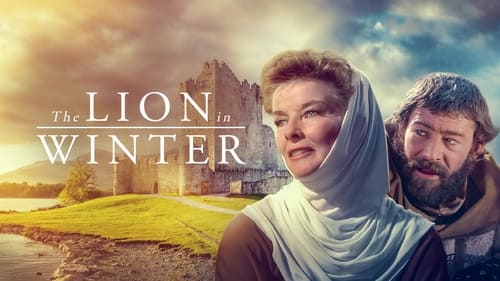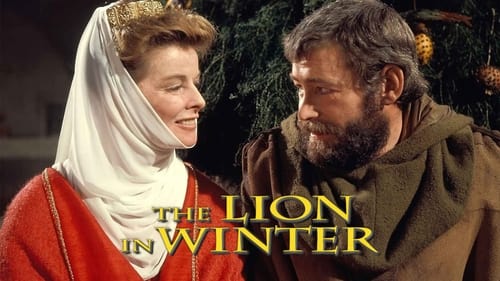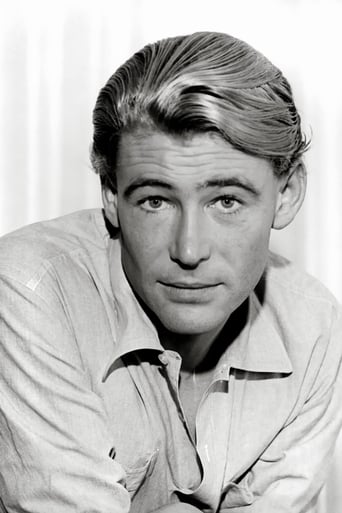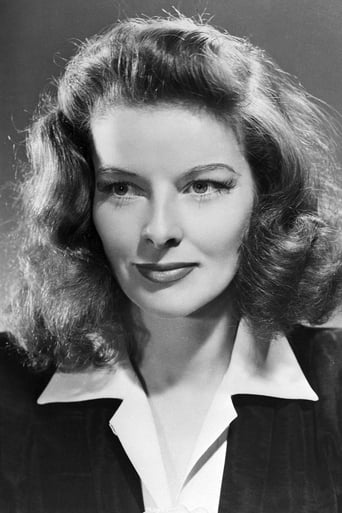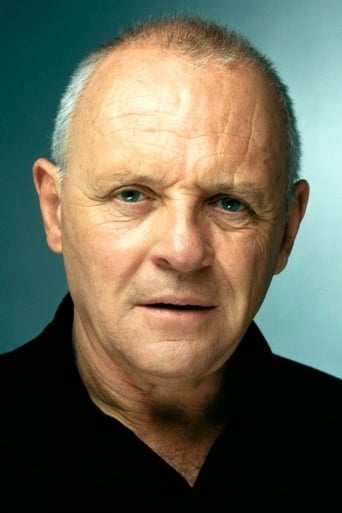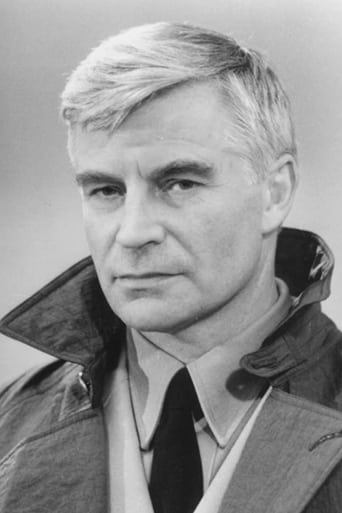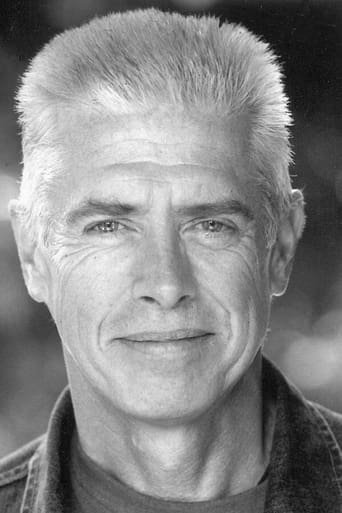BootDigest
Such a frustrating disappointment
Stevecorp
Don't listen to the negative reviews
FuzzyTagz
If the ambition is to provide two hours of instantly forgettable, popcorn-munching escapism, it succeeds.
Seraherrera
The movie is wonderful and true, an act of love in all its contradictions and complexity
TheNabOwnzz
The Lion in Winter is basically a study on immorality as a whole, as every single character seems to want to further their own agenda's and everyone seems to want to cheat eachother for self benefit. With every character having these kind of traits, it is ofcourse not easy to relate to them, but when a story is told this way with incredibly intellectual yet still coherent dialogue and some of the greatest acting and actors on the screen this makes for a fascinating immorality tale.The greatest star because of this is obviously the incredible screenplay by James Goldman as this film is such an incredible display of dialogue, editing & verbal debates in general. The symbolism and depth in the dialogue is incredible, yet it also manages to make common sense, such is the masterful skill of Goldman's screenplay. It is a motion picture fueled by its incredible use of dialogue, yet it also consists of excellent silent scenes which are used to bring out the incredible score by John Barry. Both elegant ( such as the incredible scene where Eleanor first arrives on the boat ) and haunting ( In the scene when Henry II reflects on the complications with his children near the castle walls ) John Barry's score is a stroke of genius and adds to the depressing yet also sometimes beautiful nature of this film.Yet without the incredible energetic acting by the incredible cast this film has, it would not be able to reach the level it has eventually reached. The entire cast all pull off absolutely stunning performances, but the lead performances by Peter O'Toole ( Henry II ) & Katharine Hepburn ( Eleanor of Aquitaine ) are the greatest of them all. Such stunning energetic verbal debates are constantly arising between the two of them and the intellectuality is just incredible yet believeable in these conversations. Also great performances by an early role of Anthony Hopkins, Nigel Terry, John Castle & a very young Timothy Dalton as each has an incredible screen presence and every single one just embodies their character perfectly.Yet while mostly being an indoor dialogue ridden film it also has a couple of great outdoor shots with fantastic cinematography, such as the one as stated earlier where Eleanor first arrives. It does give us time to breathe after extended verbal battles between Henry and often times either his sons or Eleanor by often times seeing him mindlessly wandering the castle halls due to his sons or Eleanor's immorality.It is such a fine display of great writing and energetic acting combined with fantastic music and a witty constantly twisting plot that it doesn't matter that immorality is the most common theme in the film, as it is a condition that is shown so splendidly that it is in itself an immersive artpiece on the study of the concept of immorality.
HotToastyRag
Picture, if you will, Who's Afraid of Virginia Woolf? set in 1100s England, and instead of dinner guests, the lead couple bickers with their adult children. Now replace Liz and Dick with Katharine Hepburn and Peter O'Toole. That's The Lion in Winter.In 1183, King Henry II is in the winter of his life. He has his heart set on leaving the throne to his youngest son, but his wife Eleanor of Aquitaine wants their eldest son to inherit. For years, Henry has imprisoned the queen in a faraway castle, only letting her out for royal functions and holidays. During Christmas, she's brought home, and the two rulers play a nonstop game of cat and mouse, constantly trying to outsmart and out-hurt the other. With their three sons and the visiting king of France as pawns, it's an incredibly lively story.Peter O'Toole reprises his role as Henry II; he'd already played him four years earlier in Becket. He gives a wonderful, emotional, frustrated performance, but in the stiff competition for Best Actor in 1969, he lost to the unworthy performance of Cliff Robertson in Charly. It's tough to pick which loss is more appalling, The Lion in Winter or Becket. In either case, and even though I'm sure Richard Burton would have been just as good if not better in this role, Peter O'Toole is impressive. The sons are played by Anthony Hopkins, John Castle, and Nigel Terry. It was Anthony Hopkins's second theatrical film, and Timothy Dalton's first; Tim was very touched that Kate would come onto the set on her days off to act with him when he did his closeups and her presence wasn't technically needed. There's an awful lot of touching trivia relating to this film. Peter and Kate enjoyed each other's company on the set, having known each other for years earlier; Peter named his daughter after her. And speaking of descendants, Katharine Hepburn's lineage can actually be traced back to Eleanor and Henry II! The art and production designs are fantastic in the film. The castle is expansive, but the rooms are mostly empty. The thrones look worn and slightly coarse, and the jewelry looks rich but primitive. Margaret Furse's costumes are in mostly dark, muted colors, and they look very authentic. Furs and large swaths of linen are draped over the actors' shoulders; there are no ornately sewn gowns because in the 1100s, lavish clothes couldn't really have been created.And finally, there's Katharine Hepburn, who won her third Best Actress Oscar for the film. She vacillates between angry, hurt, cunning, desperate, hopeful, loving, deceitful, and exhausted, and each emotional change takes the audience with her. At times she'll make you laugh and at times she'll make you cry. You'll be kept on your toes, unsure of who to trust or root for, but it'll be worth it. After all, as Kate said in the film, "Every family has their ups and downs."
Alessandro Vincinni
These days you can find much better historical films, and I don't mean Hollywood blockbusters. This film feels very weird, it is an obvious attempt to create a "great" historical play worthy of the great bard, however the result is a poor mock-up. The standard recipe followed by the script is to portray "complicated" characters, who change their mind every minute like a wind and go from quiet to yelling all the time. This mess should be interpreted as a chess game of plots and intrigues. It is also weird to see that king Henry II played by O'Toole runs around the castle like a village kid. It is just not believable that this chap holds in fear two countries and all his family. Hepburn is overacting and predictable. Hopkins as Richard is a disaster unless you want to believe that he was a soul searching majordomo. John is portrayed like a young imbecile, exactly like in a later Disney's cartoon "Robin Hood", who for some crazy reason should inherit the crown.If you want to see a real historical/theatrical drama with a similar plot, but where characters are portrayed much more realistically I would recommend "Louis XI: Shattered Power".
lasttimeisaw
This famous screen adaptation of James Goldman's play is mostly remembered for Katharine Hepburn's historic third win of Oscar's BEST LEADING ACTRESS in 1969 (yet she would further cement her unrivalled record with her fourth win for ON GOLDEN POND, 1981, 8/10), most interestingly, it is the one and only case where it is a tie for leading actress, she shares the honour with Barbara Streisand in FUNNY GIRL (1968). Directed by Anthony Harvey with Goldman as the screenwriter, headlined by O'Toole and Hepburn, well, contrary to my expectation, it comes out as a rather enervating and mind-numbing non- starter. So it all happens during Christmas 1183, King Henry II of England (O'Toole), convenes Queen Eleanor (Hepburn), whom he has imprisoned for months in a castle, and their three sons, Richard (Hopkins), Geoffrey (Castle) and John (Terry) to Chinon, Anjou for a family reunion and to discuss the issue of heir-ship, with King Philip II of France (Dalton) as their guest, and also presented is Alais (Merrow), Henry's mistress and Philip's sister, who is betrothed to Richard. That being so, it forges a cobweb of stakes around them while all the three princes contend to be crowned the future king, Richard is championed by Eleanor and John is Henry's favourite, while Geoffrey has his own calculations.Yet all the relations cannot be simply divided by love or hate, being a sterling dramaturge, Goldman maps out an intricate love-and-hate struggle between almost any two random characters, at first, it is relishing to enjoy these top players mount their mélange of feelings through their eloquent oration and wordplay, but being a different art form from a dialogue- driven play confined in a simple locale, the film version tries to duplicate the same pathos using the same method, soon the narrative steers towards excesses, there is no time for audience to ruminate the bombard of colloquies, in the next scene, the same power struggle/psychological game repeats itself between other characters, at the end of day, after all the labouring bickering, the status quo remains unseated, from choosing the right heir, to threatening of dethroning Eleanor from the title, to the extreme of murdering all his sons for the sake of marrying Alais and they can start life anew, the script is overwhelmingly rich for its 134 minutes running time, nonetheless the final upshot proves all above is merely lip service, no exciting changeover presented, all we know is for medieval people, their mouth never match their heart, it is a rather exhausting anticlimax and doesn't sharpen the process of character building. Hardly one can blame it on the cast, all is busting their asses to construct the atmosphere of dramatic intensity, even for Hopkins, Dalton and Terry (who just passed away earlier this year at a quite young age of 69), in their screen debut. Hopkins possesses a wide-eyed earnestness which is very rare in his staple phenotypes. Dalton is fiercely wet behind the ears in front of Hepburn and O'Toole, alas their undercurrent of homosexuality only superficially touched on. Terry is deliberately grotesque, Castle preserves a distinctive but untapped inscrutability and the Golden Globe nominated Merrow cannot remotely match two top-billers' expertise. Hepburn's magnificent spirit is perpetually something to shout about, so is O'Toole's frenzied outbursts, for whom we all have a soft spot considering his ill-fated Oscar journey (8 nominations with zero win), alas, neither her nor him can hold the top spot in my book for this lines-laden period elaboration. Reckoning its higher rating elsewhere and an extolled reputation, this is another specimen where a dissonance existing between one's personal view and the accepted general opinion, being a non-radical and rational film reviewer, not so often this occurs to me, so although being slightly disappointed, personally I feel delightful to retain one's own differences once in a while.


